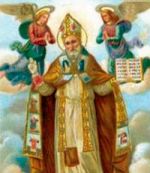Make your gift today!
Help keep Catholics around the world educated and informed.
Already donated? Log in to stop seeing these donation pop-ups.
Catholic World News News Feature
Pope and Patriarch open Pauline year June 30, 2008
Pope Benedict XVI inaugurated a special year dedicated to the memory of St. Paul with an ecumenical service at the Roman basilica of St. Paul Outside the Walls on Saturday evening, June 28.
Orthodox Patriarch Bartholomew I of Constantinople joined the Holy Father for the Vespers service. A representative of the Archbishop of Canterbury also participated in the service, as did Cardinal Andrea Cordero Lanza di Montezemolo, the archpriest of the Roman basilica, and a congregation of about 3,000 faithful.
Patriarch Bartholomew joined the Pope again on Sunday morning, June 29, at a Mass in St. Peter's basilica for the feast of Sts. Peter and Paul. Both the Pope and the Patriarch delivered homilies, and together they recited the Creed in Latin.
"We are gathered around the tomb of St. Paul, who was born 2000 years ago in Tarsus in Cilicia, in modern-day Turkey," Pope Benedict said at the Saturday service opening the Pauline year. Stressing that "Paul wishes to speak to us today," the Pontiff said that the year should be a special opportunity "to listen to him and to learn from him."
St. Paul, the Pope observed, did not shrink from controversy in his approach to preaching the Gospel. "He did not seek superficial harmony." Yet in spite of the opposition he faced, the Apostle spoke often about his sense of freedom, the Pope continued. "Those who love Christ as Paul loved Him can truly do as they please, because their love is united to the will of Christ and thus to the will of God; because their will is anchored in truth and because their will is not simply their own will."
Pope Benedict encouraged the faithful to keep in mind the words of St. Paul to Timothy: "Join with me in suffering for the Gospel." He said: "In a world where lies are so powerful, truth is paid with suffering." He exhorted Christians to gird themselves, preparing for that suffering, by strengthening their faith in imitation of St. Paul.
On Sunday, at the Mass in the Vatican basilica, the Holy Father added the example of St. Peter to that of St. Paul. "Through their martyrdom, through their faith and their love, the two apostles show were true hope lies," he said. "We could say that their martyrdom was, in the deepest sense, like giving a fraternal embrace."
The particular mission of St. Peter and his successors, the Pope said, is "to ensure that the Church never becomes identified with a single nation, a single culture, or a single state-- that she always remains the Church of everyone." Thus on this feast day, when he would impose the pallium on metropolitan archbishops from all over the world, he emphasized the unity and universality of the Church.
"The truth is that the horizon of the Pauline year cannot but be universal," the Pope observed, because St. Paul was the quintessential missionary, who brought the message of Christ to new peoples. During the year, he asked the faithful to pray for "evangelization, communion in the Church, and full unity among all Christians."
The inaugural ceremonies of the Pauline year underlined the Pope's commitment to Church unity, with the presence of Patriarch Bartholomew, the acknowledged leader of the Orthodox world, emphasizing the quest for reunion between East and West. When the Pope and the Patriarch recited the Creed together, they spoke in Greek, the language of the Eastern Church. They used an ancient formula of the faith, from the Council of Constantinople in 381. The text did not include the filioque clause which was at the root of disputes between the Catholic and Orthodox theologians for generations.






